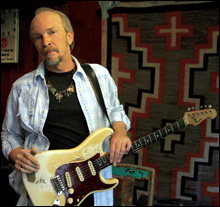
HERITAGE: The former Blaster and X guitarist pays tribute to California’s mongrel song styles in his new CD. |
For Dave Alvin, music gets interesting when it produces friction. “There are certain parts of the country that had not looser morals but looser mores, let’s say, 50 years ago,” the songwriter explains over the phone. “There are places like Bakersfield, California, where Buck Owens came out of, where the music was made for people to rub up against one another. Then there are places where there was cultural mixing — whether wanted or unwanted — and you could make a case for New Orleans as the ultimate example, and there was Houston, where the Tex-Mex, blues, and Cajun cultures all collided and combined.”Memphis, where blues and country rubbed bellies to make rock and roll, could be added to that list. Alvin also theorizes that California in general is like those locales: a place where people came from the East and the West and Europe and Asia and made a mongrel culture that hadn’t existed before. “That’s why the Grateful Dead were the ultimate California band. They never saw a problem transitioning from 20-minute space jams to Gus Cannon jug-band songs.”
Neither does Alvin, whose idea of a 20-minute space jam might instead be a cowboy ballad with a couple of hot electric-guitar solos like “Sonora’s Death Row,” from his new West of the West (Yep Roc). And whose equivalent of a high-spirited Memphis jug-band number might be the disc’s double-entendre-ripened “Redneck Friend,” by Jackson Browne. Alvin, who plays the Regattabar in Harvard Square with his band the Guilty Men next Thursday, takes a crack at capturing the cultural mix of California’s songwriting tradition with West of the West. And that means singing not only cowboy ballads but the Beach Boys’ “Surfer Girl,” Merle Haggard’s “Kern River,” Jerry Garcia & Robert Hunter’s “Loser,” Tom Waits’s “Blind Love,” and John Stewart’s “California Bloodlines.”
Alvin’s previous collection of cover tunes, Public Domain: Songs from the Wild Land (Hightone), won him his only Grammy, in 2000. But there’s nothing calculated about this year’s follow-up. In fact, he concurs that the Grammy was probably more a lifetime achievement award for his years as one of the helmsmen of the Blasters, LA’s leading punk-era roots-rock revivalists, and his tenure in X. (The band recorded his “Fourth of July.”) “Guys like me and Bill Morrissey — we live way out on the outskirts of Music Town, and when you win a Grammy, it’s a way of saying nice work and showing that somebody in music town is listening and they think, ‘You know, he doesn’t suck entirely.’ ”
He invokes the name of New England’s folk-music laureate because his previous stop hereabouts was last winter, when he spent three days in Cambridge’s Hi-N-Dry studio playing guitar on Morrissey’s next album. “It was one of the best studio experiences I’ve ever had. The room sounded great, and Bill’s new songs are really good. He’s one of the guys who understands how to get to the meat of life, and his playing amazes me.”